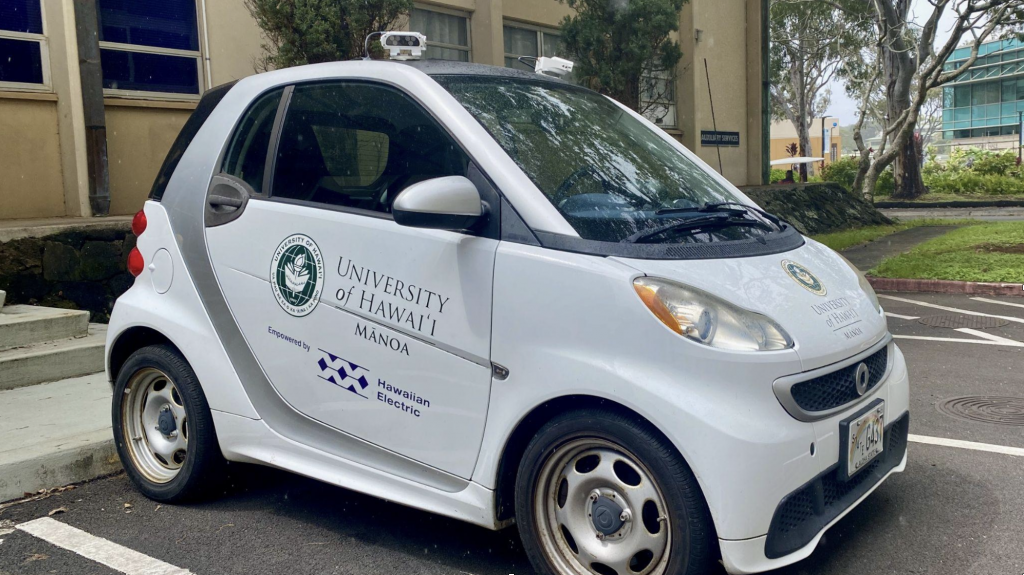
The UH Mānoa License Plate Recognition (LPR) Vehicle
What is LPR?
Automated License Plate Recognition (ALPR or LPR) is an advanced parking technology system that scans digital images of license plates, and uses character recognition algorithms to convert images into alphanumeric records. The system generates a secure database that includes the license plate number as well as the date, time and location when the scan was collected.
What information is collected?
LPR scans collect the following information:
- License plate image
- License plate number
- Date
- Time
- Parking zone
- Low-resolution context image
No owner or driver information is stored directly with the LPR record.
How is information collected by LPR used?
Information gathered via LPR will be used to analyze parking occupancy rates by time of day and day of the week in zones across campus. Analyzing commute patterns and demand for specific lots will help Commuter Services take a data-driven approach to optimizing the on-campus parking supply to maximize the benefit to the University Community. LPR has been leveraged at other universities and sites with high parking demand to better inform planning initiatives and regulatory action.
Records used for analytics are anonymized and aggregated; no personally identifiable information is present in the records.
Information gathered and collected by Commuter Services will not be:
- Used to monitor individuals.
- Sold, published, exchanged, or disclosed for commercial purposes.
- Disclosed or published without authorization.
- Disseminated to persons not authorized to access or use the information.
Who has access to the information collected by LPR?
Only trained and authorized personnel will have access to LPR records. All authorized personnel have unique identifiers and passwords, and all database activity is logged. Per UH Executive Policy 2.214, the data collected is categorized as “Restricted”, and is treated and stored as such.
All authorized employees are required to undergo the Information Security Awareness Training (ISAT) annually. This training addresses best practices for the protection of the privacy and security of Protected Data, as well as applicable federal and state laws and regulations and related UH policies and procedures.
No other University department or organization will have access to personally identifiable LPR data, nor will information regarding certain individuals be furnished to other departments for punitive or any other purposes. Supervisors, human resources, and other parties are not permitted to request parking records of employees, students, or visitors, with the exception of official investigations.
Generalized reports summarizing overall commuter trends may be shared with community partners for strategic planning purposes. However, no individual data will be released.
Where is data collected?
Data may be collected in all parking areas and streets managed or owned by the University of Hawaiʻi at Mānoa. Any vehicles driven or parked in these areas are subject to data collection via LPR.
How long are LPR records retained?
As of February 2023, the State of Hawaiʻi currently has no statute expressly addressing the use or retention of data collected by LPR systems. Consistent with other colleges and universities implementing LPR on campus, Commuter Services will purge LPR records after 12 months. Records associated with parking violation incidents will be retained with the citation record until it is purged from the database. Data may be retained for extended periods of time if: 1) a record is involved in an investigation, and/or 2) further retention is required by state or federal law.
Is LPR being used for parking enforcement at UH Mānoa?
As of February 2023, LPR is only used for data collection. If LPR will be used for enforcement at a later date, employees and students will be notified via various communication channels including, but not limited to, communications from Commuter Services, UH News, and employee Department Parking Coordinators.
What if I only have a single license plate on my vehicle?
If your vehicle is registered in the State of Hawaiʻi, the State requires that two plates be displayed: one on the front and one on the back of the vehicle (HRS 249-7(b)). If you only have one plate on your vehicle, please park so that the license plate is facing the drive aisle and is recognizable by the LPR vehicle. Vehicles without plates visible from the drive aisle may be subject to citation.
What if I get a new vehicle or a new license plate?
Please keep your Commuter Services account updated at all times. If you are a permit-holder, ensure that your license plate is linked to your permit.
If you have a brand new car with a temporary license plate, please register the last 8 digits of your Vehicle Identification Number (VIN) on your Commuter Services account. Update your account as soon as you receive your permanent license plate.
What if my license plate has special characters on it?
When you add your license plate to your Commuter Services account, omit any special characters and enter only letters and numbers without spaces.
